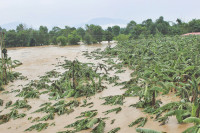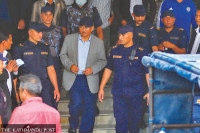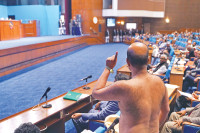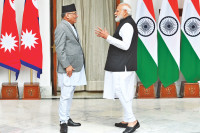Special Supplement
The risk taker
One day in 1991, two 17-year-old boys visited the secretariat of the National Planning Commission (NPC) to meet with its vice chairman, Ram Sharan Mahat. Mahat, who later went on to become the Finance Minister six times over and is now a senior leader of the Nepali Congress, still remembers the meeting, during which the two had asked him to grant them scholarships to pursue further studies.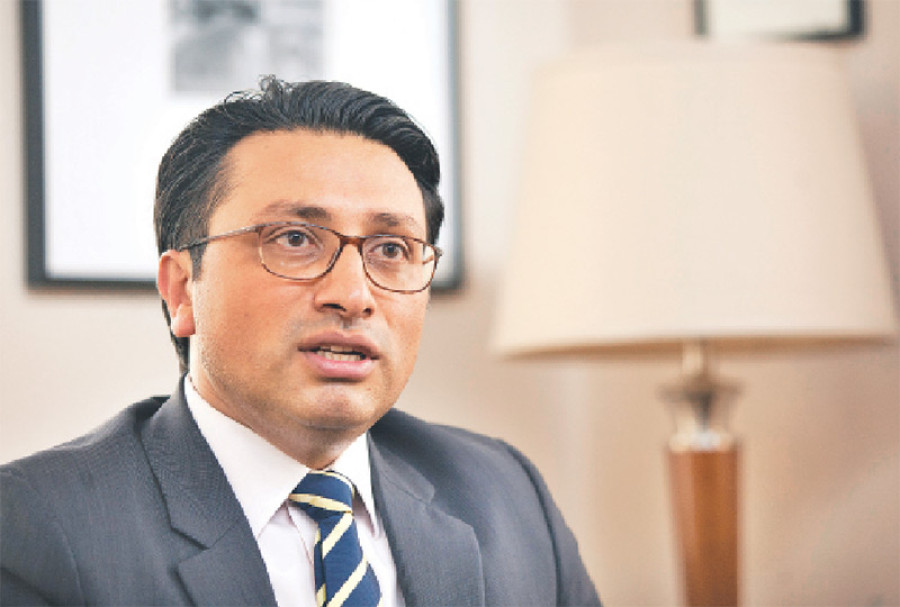
Rupak D. Sharma
One day in 1991, two 17-year-old boys visited the secretariat of the National Planning Commission (NPC) to meet with its vice chairman, Ram Sharan Mahat. Mahat, who later went on to become the Finance Minister six times over and is now a senior leader of the Nepali Congress, still remembers the meeting, during which the two had asked him to grant them scholarships to pursue further studies.
Little did the boys know that the NPC, the apex body that frames the country’s development programmes and policies, was not the right place to lobby for student grants. But Mahat did not shoo them out of his office. He calmly listened to them, personally called Bal Gopal Baidya, an NPC member appointed to cover education sector at that time, and asked him to see what could be done.
The meeting with Baidya did not yield positive results but the two boys were happy as they thought they had done their best to secure a bright future.
One of those naïve boys was Swarnim Wagle, who has now assumed the NPC seat that Mahat held in the early 1990s.
“We were quite worried about our future back then because we had just joined the economics stream, which, many said, did not have any scope,” says 43-year-old Wagle, justifying the visit to the NPC.
Wagle, who attended Budhanilkantha School, was the second highest scorer in countrywide Grade 10 board examinations (SLC) of 1990. Students with that calibre are generally expected to take up science in Grade 11 so that they can go on to become medical doctors or engineers. And, Wagle had done just that.
But everything changed once a British economics teacher, Ray Morgan, joined the school. Morgan used to take students to his residence and show documentaries on debt crisis in the Philippines and works of British PM Margaret Thatcher. These documentaries exposed Wagle to political economy for the first time, helping him connect dots that have remained engraved in his memory ever since.
As a kid, Wagle had witnessed the civil disobedience movement of 1985 that demanded a complete overhaul of the political system. This campaign was led by people who felt left out by the rigid single-party political establishment. Although the movement was suspended following bombings in Kathmandu, people rose up again to disrupt the status quo in 1990. This uprising culminated in abolishment of the single-party political system and the restoration of multiparty democracy in the country.
“These movements convinced me that politics was one of the vehicles for big transformative changes,” says Wagle, recollecting memories of the days when he was just coming of age. Morgan’s documentaries, on the other hand, helped him understand how good and bad economic policies lead to the success or failure of nations.
These incidents heightened Wagle’s curiosity about politics and economics. It also led him to quit science and take up economics and mathematics in Grade 12. The only other student who followed suit was Nuru Lama Sherpa, who had accompanied Wagle to the NPC and was the fifth highest scorer in SLC in 1990.
“The decision to take up economics created quite a stir in our school, as no one had done that before. Many called us fools and laughed at us and said we’d end up studying in mediocre colleges in Nepal and become accountants,” Wagle reminisces. This remark did make the two anxious, thus the visit to the NPC. But there was no turning back.
That was the first big risk that Wagle took in his life.
But the risk paid off well as Wagle received full scholarship to pursue a Bachelor’s degree in Economics at the world-renowned London School of Economics, while Sherpa got enrolled at Harvard University.
Since then, Wagle has obtained a Master’s degree in Public Administration in International Development from Harvard and a PhD in Economics from the Australian National University. He obtained these degrees without spending a penny of his own.
While Wagle spent his formative years in London School of Economics, which strengthened his roots, he became intellectually more matured at Harvard, where he met professors like Jeffery Sachs and Dani Rodrik—two world-renowned economists—who helped make him academically sound. No wonder, one of the external examiners of his doctoral thesis, who happened to be renowned trade economist and professor of International Economics at Johns Hopkins University, Pravin Krishna, said in a note: “It is rare, in my experience, to see a thesis as highly polished as this one, needing virtually no comment or modification before the chapters are submitted for publication.”
Wagle was no doubt an excellent student. But a string of A’s does not always guarantee success. There are students who have found that sound understanding of theories on micro- and macro-economics, and skills on econometrics and economic modelling, do not always equip them with tools to survive in the real world. This can be quite a rude awakening and may even create frustration.
This is when Murray Gibbs came into Wagle’s life.
Gibbs, according to Wagle, worked at the United Nations Conference on Trade and Development (UNCTAD) for 30 years, negotiating bilateral and multilateral trade deals. “He taught me how to form negotiating positions on trade agreements, especially those related to the World Trade Organisation,” says Wagle, who met Gibbs while working for a United Nations (UN) programme in Vietnam. This helped Wagle blend the knowledge obtained from the world’s best schools with real-world issues. This shaped his career and life, making him able to market his skills around the globe.
Wagle has, therefore, faced very little problem in finding jobs. He has been hired by World Bank’s headquarters in Washington, DC several times in different positions. He has also served the UN Development Programme’s Kathmandu office, Vietnam- and Sri Lanka-based Asia Pacific Trade and Investment Initiative, and New York-based Human Development Report Office. These jobs turned Wagle into a globe-trotter, exposing him to different cultures and societies.
“I had a great life abroad,” says Wagle.
Yet the one thing he had always wanted to do was return to Nepal, work for the government and drive change.
Wagle had first shown interest to work for the Nepal government in 2006 when late Nepali Congress leader Girija Prasad Koirala was the prime minister. At that time, he had exchanged e-mails with then finance secretary Rameshore Khanal and even talked to Mahat, who was the finance minister. Wagle had requested the duo to hire him as an advisor at the Ministry of Finance.
Later, Mahat, who had himself left the UN’s job and entered Nepali politics, discouraged Wagle to return to Nepal as the Maoists had emerged as the largest party through the elections and were about to form the government. Mahat was worried that Wagle would be boxed out once Maoists took over the driving seat.
This culled Wagle’s dream to work in Nepal for the time being.
Then in 2013, when Wagle had just landed a dream job of senior economist at the World Bank in Washington, DC, he received an e-mail from Khanal, asking him to come back and work in Nepal.
At that time, Nepali Congress had emerged as the largest party through the second Constituent Assembly election and Mahat had returned to the Ministry of Finance as the Finance Minister. Although Khanal had left civil service by then, Mahat had asked him to provide policy recommendations and scout for qualified people who could frame sound development policies. When Khanal told Mahat to reach out to Wagle, Mahat was sceptical because he knew Wagle had bagged a lucrative job at the World Bank, which had elevated him to the upper-middle income group in the US.
Amid this, Wagle, who was leading a mission to India, dropped by Nepal and met with Khanal, Mahat and Minendra Rijal. “I told them quite frankly that I’d quit my permanent World Bank job and return to Nepal if they were willing to appoint me as a member to look over macroeconomics at the NPC,” says Wagle. All of them said they’d try their best. But Mahat went a step ahead.
“I told him I’d hire him as an advisor at the Ministry of Finance even if the government denied appointing him as an NPC member,” says Mahat, who calls Wagle a hardworking and brilliant individual with lots of international experience and a commitment to work for Nepal’s development.
This assurance paved the way for Wagle’s eventual return to Nepal.
“I took the risk because I always wanted to work at the top policy level of the Nepal government. That is why I had studied economics,” he says, adding, “People do not always look for money; they look for recognition, influence, impact and power as well.”
He was happy. His wife, a Vietnamese anthropologist with a PhD degree from University of Toronto, also supported his decision. So, he and his wife—whose grandfather was an education minister in Vietnam for 29 years and a close friend of modern Vietnam’s founding father Ho Chi Minh—packed their bags, carried their son, who is now five and a half years old, and took a flight to Nepal.
Once in Nepal, nobody in the Cabinet objected to his appointment as a NPC member.
NPC membership is a portfolio equivalent to that of a junior minister. And like junior ministers all over, who are not very influential, the NPC does not allow its members to wield much power to drive change either. This is because of the structure of the NPC, which has empowered the vice chairperson and everyone has to work as per the vision of that person. So, vice chairpersons overshadow the role of members.
But Wagle was fortunate to have found Govind Pokharel as his boss at the NPC. Pokharel, a liberal-minded leader, listened to him, gave him the liberty to work on his own and allowed him to take part in the decision-making processes.
This freedom enabled Wagle to carve a niche for himself. And he rose to the occasion after the earthquakes hit Nepal in April and May, 2015. The earthquakes had caused widespread devastation across the country. And the government had directed the NPC to measure the losses. Wagle then became a key architect of the national report on Post Disaster Needs Assessment, which gave a ballpark figure on damages and destruction caused by tremors. The report, according to the international community, was highly credible. This prompted Nepal’s development partners to pledge over $4 billion in aid for Nepal’s post-earthquake reconstruction. It was Wagle’s biggest achievement during his first stint at the NPC.
As time passed, Wagle was becoming familiar with Nepal’s bureaucracy but then the government changed. Suddenly, Wagle, who had quit a lucrative World Bank job, found himself jobless after barely 18 months at the NPC. He was not expecting this because the Nepali Congress had emerged as the largest party in the elections and was hoping the party to lead the coalition government till the next round of elections. Yet he kept calm and did not look for jobs abroad.
He rejoined the NPC again as a member after Pushpa Kamal Dahal took the reins of the government. Then in August, after Sher Bahadur Deuba became the prime minister, Wagle was appointed as the vice chairman of the body.
His hiring as the de facto chief of the NPC was welcomed by many. Many even said this was the best decision made by Deuba since he became the premier. But Wagle may not be able to deliver much during this tenure, because the government is likely to change soon and he will have to step down after that.
Yet Wagle has set some agendas. One is to transform the NPC into an apex think-tank of the government.
The government needs a top-notch think-tank more than ever before, because Nepal’s long-delayed political transition, which started with the entry of Maoist rebels in mainstream politics in 2006, has ended following the shift from unitary to federal government system and successful completion of local, state assembly and federal parliamentary elections. This technically means lengthy political negotiations on matters such as the constitution would no longer consume much of the government’s time. This will provide space to the government to focus on development issues, which could give impetus to economic growth and deliver prosperity to people.
Wagle and his team have already made necessary changes to the legal document to morph the NPC into a think-tank and forwarded it to the Cabinet.
The new NPC, according to Wagle, should coordinate policy across sectors in the new federal setup. “This will relax critical constraints to economic growth,” says Wagle, whose vision of a reformed NPC is an “agile, technically proficient and private-sector friendly policy arm of the Prime Minister’s Office”.
To design and coordinate policy, the government needs adequate information, for which quality data are required. Wagle very well understands the value of data because he is someone who has always played with millions of data points, processed them, conducted regression analyses and developed models before coming to conclusions.
Wagle has, therefore, always pushed to strengthen the Central Bureau of Statistics (CBS) to promote evidence-based decision-making in the country. The CBS, under Wagle, has prepared the draft of the National Strategy for the Development of Statistics to standardise collection, processing and dissemination of statistics, and improve data management. The draft of the strategy has been forwarded to the Cabinet.
Recently, Wagle also restarted the process of drafting a long-term development vision called Nepal 2030–a work that he started during his first stint at the NPC. The document will have a unified approach in meeting several milestones such as migrating from the grouping of least developed countries to that of
developing countries by 2022, attaining UN-backed Sustainable Development Goals by 2030, and becoming a middle-income country by 2030.
Wagle is a diligent person who deeply cares about development issues, believes in a welfare state and devotes time and energy to “drive change”.
The Post tried to get comments from two people who have worked with him to unearth his weaknesses, but one denied to discuss the issue and the other, on condition of anonymity, said: “He is academically the best person in Nepal. But he is yet to gain deep understanding about Nepali economy to become successful at the operation level.” Many believe he will have sound knowledge about Nepal once he starts visiting the nooks and corners of the country over the years.
But will he stay in Nepal as the Nepali Congress, which appointed him as the vice chair of the NPC, has lost the election and will have to quit the government soon? This is the big question many are asking.
But Wagle says: “I’m here to stay.”




 9.25°C Kathmandu
9.25°C Kathmandu

